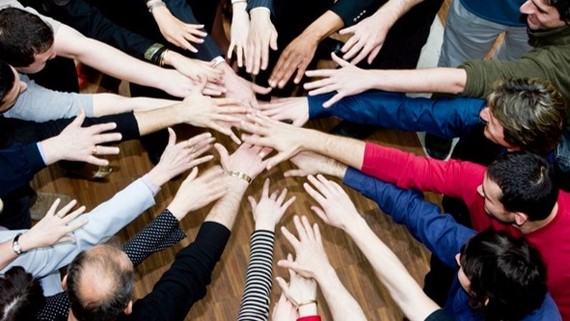Imagine a workplace where people are allowed to play and even better encouraged to play. Believe it or not, that is what is happening in some organizations. Look at Google, all employees have access to and can play during their workday. They have all sorts of activities like bowling, meditation, wall climbing, volleyball and more. Facebook, LinkedIn and Ideo also provide opportunities for play time at work, anything from ping-pong to arcade games and a few take it one step further by instilling a culture of play. These fun activities are not just for lunch, employees can get up and go play when they get tired of working on a project or answering emails.
Most think of play at work as a distraction, -- inappropriate or simply a waste of time. The paradigm of play is that it's seen as taking time away from "real work." Just think, what if what we thought work could benefit from play? What if, the opposite of play isn't work, but rather boredom? We have made assumptions over the years that play doesn't belong during work hours. As a communication and culture consultant, the typical conversation with clients is often about employee engagement and how to create a more positive and energized workforce. I believe play is the vital missing solution at work. Play in my definition is simply having fun, being joyful and energized. Wouldn't it be great if all employees were having fun while at work?
In his book Play, author and psychiatrist Stuart Brown, MD, compares play to oxygen. He writes, "...it's all around us, yet goes mostly unnoticed or unappreciated until it is missing." Think about how play shows up in your life? Play is games, art, books, sports, movies, music, comedy, flirting, talking and even daydreaming. More trainers, and consultants are using games and out-of-the-box activities to bring play into the workplace even if it's within a teambuilding experience or company event. When learning is fun, employees are more inclined to remember what they learned and use it.
Dr. Brown, is also the founder of the National Institute for Play, and he states, "when employees have the opportunity to play, they actually increase their productivity, engagement and morale." It begs the question, why aren't all companies insisting on more playtime at work? Dr. Brown goes on to say, "Not only does having a playful atmosphere attract young talent, but experts say play at work can boost creativity and productivity in people of all ages. There is good evidence that if you allow employees to engage in something they want to do, (which) is playful, there are better outcomes in terms of productivity and motivation."
The good news is that there are a lot of benefits for bringing play into work.
Other research shows that play can decrease absenteeism, stress, and health care costs. When employees take time out to play, it lessens the stress of work, which leads to less sickness, a more positive attitude and more energized work environment.
Allowing play in the workplace is good for business and employees. It's a win-win The opportunity to play on the job shows employees that they are valued, and helps them lead a more balanced life. In turn, employees are more engaged, collaborative, focused when they are working, more creative and ultimately perform better. By encouraging play at work, it increases job satisfaction and general employee happiness, and happier workers have been shown to be more productive and increasing profits. What will you do today to play a little more while at work? I dare you.
Michelle Burke is a Communication and Workplace Strategist, published Author, Consultant, and Speaker. She is Co-founder and President of The Energy Catalyst Group dedicated to creating more positive and engaged workplaces. Her years' experience working with Fortune 100, 500 companies, established her as a leading expert in bridging communication, gender and cultural gaps. Michelle consults with HR and leadership to focus on increasing individual, team and organizational energy. She collaborates with clients using her 3-A Model: Awareness, Accountability and (purposeful) Action. Clients include Stanford University, Visa, Sony, Disney, Receptos and Genentech. Michelle authored, The Valuable Office Professional, and was featured in Business Week's Frontier Magazine, LA Times, SF Chronicle, and Wall Street Journal. Her articles have been in Training, HR, and Chief Learning Officer Magazines. She also co-created Personalogy™ made Amazon's Top 100 Best Selling Card Games of 2015. Please connect with her Michelle@energycatalystgroup.com

